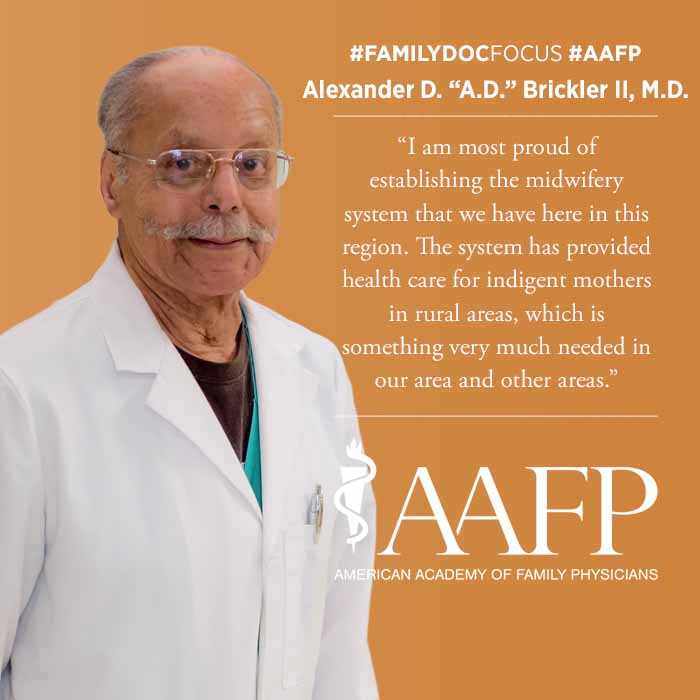FP Delivers Best of Family Medicine Throughout Long Career
May 20, 2019 09:55 am Jessica Pupillo – During his 65-year career as a family physician, Alexander D. "A.D." Brickler II, M.D., has cared for a remarkable number of Tallahassee families. With a career that's about twice as long as that of the average physician, Brickler chalks up his longevity to luck and good genetics.
The recently retired 90-year-old physician has delivered more than 30,000 babies, many of whom proudly call themselves "Brickler Babies." He also helped deliver racially integrated health care to his Florida city.
Drafted near the end of the Korean War, Brickler completed his residency training at Lockbourne Air Force Base near Columbus, Ohio. When he arrived at the base, the commander asked him whether he knew anything about surgery. When Brickler said yes, he was assigned to obstetrics.
In 1957, Brickler moved to Tallahassee, where he joined the primary care practice of his father-in-law, R.L. Anderson, M.D.; the practice later became known as Anderson-Brickler Midwifery Obstetrical Services.
At the time, Brickler practiced at the only hospital in Tallahassee that cared for black residents: Florida A&M University Hospital. Back then, Tallahassee Memorial Hospital -- just three miles away -- would not accept black patients and did not employ black staff. However, the civil rights movement would soon change that, and Brickler would play an important role in integrating Tallahassee's health care.
"It was exciting! In the 1960s, we were in the process of desegregation," Brickler said.
Leading the charge to integration, Brickler welcomed indigent white women into his practice. FAMU hospital would eventually close in 1971 due to a lack of state funding. However, as a result of numerous conversations and careful planning between administrators and doctors at both facilities, FAMU hospital staff were brought on board at Tallahassee Memorial. Nobody was let go, Brickler recalled, and there was no disruption in service.
"The hospital that was taking care of the black community at the time was closing due to lack of funding," he explained. "It was our job -- from the black community side and the white community side -- to desegregate without any undue disruption in service. We got that done and desegregated the white hospital by bringing staff from the old A&M hospital on board with their full responsibilities.
"We actually had started desegregation by taking indigent white obstetrical patients; we desegregated the black hospital first. I had my role, and I wasn't by any means a sole person involved. It took the whole community to get this done, and I'm pretty proud of it."
Given Brickler's lifelong focus on welcoming new generations into the world, it's not at all surprising that what he treasures most about his long career is the work he's done to help others take on that role. "I am most proud of establishing the midwifery system that we have here in this region," he said. "The system has provided health care for indigent mothers in rural areas, which is something very much needed in our area and other areas."
Thanks to that work, half a dozen midwives now provide prenatal care to women at surrounding county health departments. Anderson-Brickler Midwifery Obstetrical Services is also affiliated with the Tallahassee Memorial Family Medicine Residency Program, where Brickler has trained more than 330 residents to provide inpatient obstetrics.
His lasting impact has earned him numerous awards, including Family Doctor of the Year in 1982, the last year the award was bestowed jointly by the AAFP and Good Housekeeping magazine. He's also received two lifetime achievement awards and ran the Olympic torch through Tallahassee for the 1996 Olympics. In 2014, Tallahassee Memorial Hospital named part of its facility in his honor, and today, women visit the Alexander D. Brickler, M.D., Women's Pavilion for their health care.
It goes without saying that Brickler's seen a host of changes in his long career, and not all of them positive, in his opinion.
"Family medicine has changed so dramatically since I got into it years and years ago. Family physicians have withdrawn from the hospital and that type of intensive care. It's rare to find them in a large city environment doing in-hospital care. It's an evolutionary change. I regret that."
Even so, while Brickler is enjoying his retirement, there's another Dr. Brickler providing women's health care in Tallahassee. Brickler's son Alexander J. "A.J." Brickler III, M.D., an OB/Gyn, continues delivering on his father's legacy of exceptional care and, of course, Brickler Babies.
